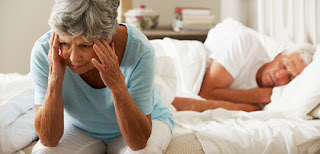Why Sleep Pattern Alters As You Age
Are you getting enough sleep? Most men and women over the age of
65 years worry about their inability to have a great sleep. Quite a number of
ageing people very often suffer from insomnia and other sleep problems.
The older we get, the more disruptive our sleep pattern. In
general terms, older people sleep less, go through broken sleep, and stay longer
in deep sleep and dream sleep stages than younger people. Nevertheless,
irrespective of age, good invigorating sleep is vital to physical health and
emotional well-being.
Causes of broken sleep in older
people
Several causes are responsible for restless sleep as people get
older. These include:
·
Bad sleep habits: Yoyo sleep-wake patterns
can affect a person’s circadian rhythm and make it hard to maintain a consistent
sleep schedule. Other sleep deprivation issues such as consumption of alcohol
before bedtime, inability to allow the brain a deserved rest, spending more
hours staring at the ceiling when in bed, or daytime siesta, can also affect a
person's ability to sleep.
· Drugs: medications may
disrupt a person's ability to fall asleep or stay asleep and may even trigger
insomnia.
·
Mental distress or disorders: Aging comes along with several life events, some cheery and some
not so cheery. Some elderly people go through psychological distress or
psychiatric disorders that will influence the quality and quantity of sleep.
For example, life changes such as the death of a loved one, moving from a
family home, or physical limitations due to illness can cause significant
stress and sleep problems.
·
Sleep complaints: There are sleep problems associated with ageing in some cases,
such as sleep apnea, restless legs syndrome, periodic limb movement and REM
behavior issue.
·
Retirement: Retirement often brings less daytime activity hence a lot of
downtime, which often lead to erratic sleep pattern and serious sleep problems.
Age aside, people have different sleep
experience. If your sleep is easing off than when you were younger, but still
feel rejuvenate and vibrant during the day, it might mean that you now need
less sleep. However if your restless sleep is impacting your daily activities,
then you should discuss with your doctor.
Photo Credit: Creative Commons

Comments
Post a Comment